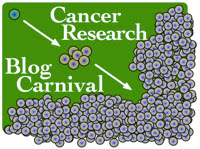The first patient trials have now been done, and the results are in. Surgically excised glioblastomas showed signs of reversal of the Warburg effect and increased apoptosis.
The clinical trial was quite small, involving 5 patients with neuroblastoma being treated with various standard therapies plus DCA. Three showed regression of their cancers, though it's not certain whether it was the DCA or the existing treatment responsible for the change.
Both Abel Pharmboy [Dichloroacetate not yet an effective treatment for aggressive brain cancer] and Orac [Dichloroacetate (DCA) and cancer: Déjà vu all over again] have excellent descriptions of DCA, how it works and analysis of the trial on their respective blogs. The bottom line seems to be that DCA remains interesting, but needs to benefit from more research and well-designed trials before moving to a real treatment.

 Podcast
Podcast




2 comments:
Try DCA in a batch of rodents with zenografted human cancer. It would restore mitochondrial energy production and further cut cancer cells energy supply by simply cutting glucose levels.
Forgot to add,, try DCA with Metformin,, as it would cut glucose levels, while DCA restored mitochondrial function.
Post a Comment